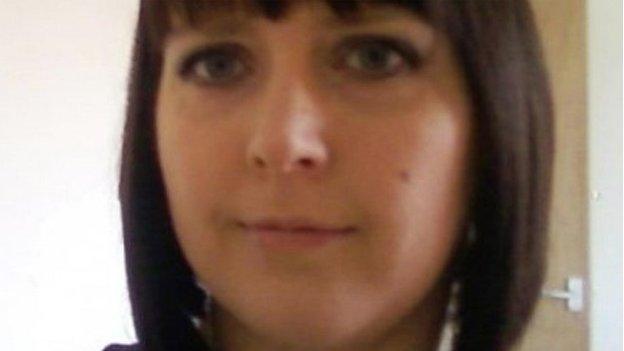Scotland to pilot 'Clare's Law' to tackle domestic violence
- Published

Clare's Law is named after Clare Wood, who was murdered by her ex-boyfriend in 2009
A scheme allowing people to find out whether their partner has a history of domestic violence, known as Clare's Law, will be piloted in Scotland.
First Minister Alex Salmond, who is also considering a new domestic abuse offence, outlined a planned trial of the police disclosure scheme.
It is named after Clare Wood, who was murdered by her ex-boyfriend in Salford, Greater Manchester, in 2009.
A similar scheme was rolled out across England and Wales earlier this year.
Police recorded 60,080 incidents of domestic abuse in Scotland in 2012-13, up slightly from 59,847 in the previous year.
The issue of a Scottish version of Clare's Law had been raised with the first minister by Scottish Conservative leader Ruth Davidson in March.
Speaking during first minister's questions at Holyrood, Mr Salmond told Ms Davidson the Scottish government was "carefully considering" a call from Solicitor General, Lesley Thomson QC, for a specific offence of domestic abuse to be created.
He added: "The chief constable (Stephen House) has today proposed a multi-agency group to set up and develop a pilot on a Clare's Law disclosure scheme in Scotland."
The first minister said the initiatives would be "carefully considered as they unfold".
Ms Davidson welcomed Mr Salmond's announcement in the Holyrood chamber, before later releasing a statement in which she thanked the Scottish government for taking on board the concerns of campaigners.
She added: "Thousands of people across Scotland suffer domestic abuse each year, and this law could help protect many of them.
"We know from pilot schemes in other parts of the UK that Clare's Law works, and Scotland couldn't afford to be left behind.
"We need as many tools as possible to tackle domestic abuse and Clare's Law is an important addition to that toolbox. It will help victims and reduce abuse."
It followed a call from Ms Thomson, Scotland's second most senior law officer, for the law on domestic abuse to be strengthened.
Speaking at a conference in Glasgow, the solicitor general said domestic abuse attacked a person's confidence and self-esteem.
But she said in most cases the full impact of abusive behaviour was not put before the court, because the current criminal law looked at individual incidents rather than being able to take an overview of a full pattern of behaviour.
'Coercive control'
"Domestic abuse is very complex, and we understand that it is complex now," she told BBC Scotland.
"It involves certain elements of behaviour, which on their own would not be seen to be criminal under the law, but which in a pattern of behaviour which the experts tell us is coercive control.
"In other words, the controlling of an individual within a relationship by physical, sexual, psychological, financial, emotional behaviour, all with the purpose of dominating that person and removing their identity."
She said specialist legislation, similar to stalking laws introduced in 2010, would also send a clear public message that this sort of conduct was not acceptable and would not be tolerated.
Lesley Thomson said domestic abuse is complex and can take many forms
Speaking ahead of Mr Salmond's announcement, Mhairi McGowan, manager of Glasgow-based Assist, an independent support agency for victims of domestic abuse or violence, said new legislation would be an innovative and groundbreaking move.
She said: "We support victims through court every day who struggle to understand why the full impact of their experiences, cannot be taken into account by police and prosecutors.
"Indeed, the absence of such a crime undermines victims of abuse and colludes with perpetrators as many of their acts go unseen and unchallenged."
Lily Greenan, manager at Scottish Women's Aid, said: "In general, Scottish justice system responses to domestic abuse have greatly improved over the last few years.
"But the legal approach to the issue continues to focus on discrete incidents of abuse rather than the set of behaviours described so routinely to Women's Aid by women seeking support.
"As a result, we see many cases of domestic abuse treated by the courts as a series of minor assaults, with limited recognition of the enormous impact that years of this kind of abuse has on women and on their children.
The Scottish government has already introduced measures to improve the handling of domestic abuse cases including specialist courts and closing a loophole to allow prosecution for threatening or abusive behaviour.
In future, it plans to make more use of screens and video links in court cases.
There are six courts dealing solely with cases of domestic abuse cases - including in Glasgow and Edinburgh.
But the Crown Office and Procurator Fiscal Service (COPFS) said it is hoping to establish more across the country.
Anne Marie Hicks, national Procurator Fiscal for Domestic Abuse, said she would continue working with other prosecutors and sheriffs to extend the network.
She said; "I think it sends out a really positive message to society and to a local area that we take domestic abuse really seriously; we have a dedicated court which is going to look at this and to deal with it.
"I think this sends out a very strong deterrent message as well."